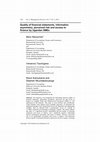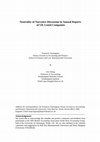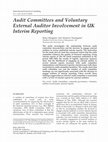Journal Articles by Venancio Tauringana
Purpose -This paper reports the results of an investigation of the relative importance of working... more Purpose -This paper reports the results of an investigation of the relative importance of working capital management, measured by the cash conversion cycle (CCC), and its components (inventory, accounts receivable and accounts payable) to the profitability of SMEs.
Papers by Venancio Tauringana
Journal of Applied Accounting Research, 2006
This paper, for the first time, classifies narrative information into complementary and supplemen... more This paper, for the first time, classifies narrative information into complementary and supplementary. For the purpose of the paper, complementary narrative information is defined as that information which refers to specific numbers presented in the statutory accounts (profit and loss and balance sheet). Non-specific narrative information is classified as supplementary. Having made the distinction and provided reasons for such a
Journal of Applied Accounting Research, 2004
This paper reports the results of an investigation into the neutrality of the narrative discussio... more This paper reports the results of an investigation into the neutrality of the narrative discussion of financial performance and position, as evidenced in 179 annual reports of UK listed companies. Neutrality of narrative discussion was determined by comparing the average proportions of good and bad news contained in the narrative and statutory accounts sections of the annual reports. The results

Research in Accounting in Emerging Economies, 2012
ABSTRACT Purpose The purpose of this paper is to investigate transition road map problems encount... more ABSTRACT Purpose The purpose of this paper is to investigate transition road map problems encountered by the Nigerian authorities in moving from local Statements of Accounting Standards (SAS) to International Financial Reporting Standards (IFRSs). Design/Methodology/Approach A postal questionnaire survey of 50 accounting professionals which includes Nigeria’s Financial Reporting Council and other industrial specialists was undertaken. Descriptive statistics were used to determine the most common problems. Independent t-tests were employed to determine whether there were any significant differences in the perception of the problems according to job type, experience, sector and gender. Findings The questionnaire findings suggest that many problems have been encountered in the as yet unfinished transition from SAS to IFRs. These include lack of training on IFRS at tertiary institutions and the fact that Nigerian regulators do not have sufficient capacity to drive the transition process. The results also show that there are some significant differences in the perception of the transition road map implementation problems according to job type, experience, sector and gender. Research Limitations/Implications The study’s results are based on responses from 50 out of a possible 500 accounting professionals surveyed and therefore cannot be generalized. The problems documented in the results should therefore be regarded as indicative rather than exhaustive. Practical Implications- This paper has practical implications for the Nigeria’s Financial Reporting Council as it may want to review why the road map was not achieved and assess whether any lessons could be learnt for the future. The results are also important especially for those listed companies that failed to meet the January 2012 deadline for IFRS reporting. Originality/ Value This paper identifies Nigeria transition problems that are peculiar to Nigeria in its bid to be IFRS compliant some of which have not been documented by existing literature. Second, it is the first study to document accounting standards transitional problems in the African context. Key words: statement of accounting standards; international financial reporting standards, road map, implementation, Nigeria. Paper Type Research paper
International Journal of Public Sector Management, 2015
ABSTRACT

A number of committees of enquiry have been established in recent years to make recommendations f... more A number of committees of enquiry have been established in recent years to make recommendations for improving the effectiveness of audit committees (AC) in their oversight of the financial reporting process. A consensus view of these committees is that the effectiveness of the AC is dependent upon certain characteristics. Prior research has extensively examined the relationship between AC characteristics and the quality of financial reporting. Although this research suggests that the AC has an effect, little is known about how this is accomplished. In this study, we attempt to shed some light into this by investigating the relationship between five AC characteristics (independence, share ownership, financial expertise, size and number of meetings) and external auditor engagement to review interim reports, another important dimension of financial reporting. After controlling for board characteristics (executive directors' share ownership and proportion of non-executive directors)...

Abstract: The eminence of investigating the relationship between quality of financial statements,... more Abstract: The eminence of investigating the relationship between quality of financial statements, information asymmetry, perceived risk and access to finance by Ugandan Small and Medium-sized Enterprises (SMEs) is well understood in the literature. This study is cross-sectional and correlational. Using Ordinary Least Squares (OLS) multiple regression, we determine the magnitude/strength of the relationship between the dependent and independent variables. Data are obtained from a questionnaire survey of a sample of 75 SMEs registered and operating in Kampala, Uganda. The results indicate that there is a significant positive relationship between quality of financial statements and access to finance, and a significant negative relationship between information asymmetry and access to finance. However, perceived risk is not significantly associated with access to finance. The interaction between quality of financial statements and perceived risk is negative, meaning that high-quality financial statements coupled with high perceived risk will result in low access to finance. Overall, our model explains 63.7% of the variation in access to finance.
Keywords: quality of financial statements; information asymmetry; perceived risk; access to finance; SMEs; small and medium-sized enterprises; Uganda.
Reference to this paper should be made as follows: Nanyondo, M.,
Tauringana, V., Kamukama, N. and Nkundabanyanga, S. (2014) ‘Quality of financial statements, information asymmetry, perceived risk and access to finance by Ugandan SMEs’, Int. J. Management Practice, Vol. 7, No. 4, pp.324–340

The British Accounting Review, 2014
ABSTRACT This paper investigates the effect of the 2009 guidance of the Department for Environmen... more ABSTRACT This paper investigates the effect of the 2009 guidance of the Department for Environment, Food & Rural Affairs on greenhouse gas (GHG) disclosure. The sample comprises 215 companies from a population of London Stock Exchange FTSE 350 companies over four years (2008-2011). To quantify GHG disclosure, a research index methodology is employed, with information derived from several GHG reporting frameworks. The econometric model is estimated using panel fixed effects. Our findings suggest that the publication of the 2009 guidance has had a significant effect on the level of GHG disclosure, and that corporate governance mechanisms (board size, director ownership, and ownership concentration) also affect the extent of GHG information disclosure. The results also indicate that companies increased their disclosures prior to the 2009 guidance in anticipation of its publication. These results have important implications for the government, suggesting that non-mandatory guidance could increase disclosure as much as do mandatory requirements.
Research in Accounting in Emerging Economies, 2008
... Citation: Venancio Tauringana, Martin Francis Kyeyune, Peter John Opio (2009), Corporate gove... more ... Citation: Venancio Tauringana, Martin Francis Kyeyune, Peter John Opio (2009), Corporate governance, dual language reporting and the timeliness of annual reports on the Nairobi stock exchange, in Professor Mathew Tsamenyi and Dr. Shahzad Uddin (ed.) Corporate ...
Social Responsibility Journal, 2014
Purpose -The purpose of this paper is to draw from multiple theories of upper echelons, stakehold... more Purpose -The purpose of this paper is to draw from multiple theories of upper echelons, stakeholder, agency, resource-based view and stewardship to establish the extent to which human capital (other than that of the board itself) in service organisations affect board role performance in those service sector firms.
European Accounting Review, 2007
... some com-pliance with the content, but not with the spirit of the OFR. ... only examine the d... more ... some com-pliance with the content, but not with the spirit of the OFR. ... only examine the degree of compliance, we investigate potential underlying determinant factors of ... and explanatory notes, and (2) financial statements (39 items), incorporating the income statement, balance ...

Managerial Auditing Journal, 1998
ABSTRACT This paper reports the findings of a study of how new universities train research studen... more ABSTRACT This paper reports the findings of a study of how new universities train research students in accounting and finance from a student perspective. The purpose is to provide evidence of the problems faced by the new universities in offering research degrees in accounting and finance, and how these problems are addressed. It was found that the new universities have made a major commitment to research students’ training since 1992. Financial incentives were offered to attract research students. Experienced supervisors were borrowed from other subject areas and established universities to make up for the internal shortage. Despite these efforts, students might suffer from a lack of an appropriate research culture and environment. Nearly half the students could not obtain advice from persons other than their supervisors, and more than half the number of students responding to the questionnaire did not take any formal research method course. The majority of the students found it relatively hard to surprise their supervisors by progress, to make their relationship with their supervisors amicable and enjoyable, to make a workable time schedule, and hard to obtain advice from non-supervisors. They also expressed their wish for their supervisors to treat supervision as a higher priority, and be more knowledgeable and more available when needed.
Managerial Auditing Journal, 2000
Small companies with a turnover of up to £90,000 have been exempted from a compulsory audit since... more Small companies with a turnover of up to £90,000 have been exempted from a compulsory audit since 1994. This paper is an investigation of why some small companies chose to continue with the audit whilst others abandoned it. The basic hypothesis of the paper is that a major ...
Journal of International Financial Management & Accounting, 2007
We investigate the association of foreign share ownership with firm-level disclosure and corporat... more We investigate the association of foreign share ownership with firm-level disclosure and corporate governance structures in Zimbabwe, a developing country in Southern Africa. Our motivation for the study derives from the literature, which suggests that foreign investors:

Journal of Applied Accounting Research, 2004
This paper reports the results of an investigation into the neutrality of the narrative discussio... more This paper reports the results of an investigation into the neutrality of the narrative discussion of financial performance and position, as evidenced in 179 annual reports of UK listed companies. Neutrality of narrative discussion was determined by comparing the average proportions of good and bad news contained in the narrative and statutory accounts sections of the annual reports. The results of a comparison of the proportion of good news in the two sections of the annual reports suggest that the narrative sections contained a significantly higher proportion of good news than the statutory accounts sections. Comparison of proportions of bad news, however, indicates that the narrative sections contained a significantly lower proportion of bad news compared to the statutory accounts sections. Finally, the results also suggest that the proportion of good news as compared to bad news in the narrative sections is significantly higher than the proportion of good news compared to bad news in the statutory accounts section. The results are consistent with the suggestion that company management highlights good news in narrative discussions. The implications of the findings for company management, users, auditors and regulators are discussed. 2
Journal of Applied Accounting Research, 2006
This paper, for the first time, classifies narrative information into complementary and supplemen... more This paper, for the first time, classifies narrative information into complementary and supplementary. For the purpose of the paper, complementary narrative information is defined as that information which refers to specific numbers presented in the statutory accounts (profit and loss and balance sheet). Non-specific narrative information is classified as supplementary. Having made the distinction and provided reasons for such a

International Journal of Auditing, 2008
The study investigates the relationship between audit committee characteristics and the decision ... more The study investigates the relationship between audit committee characteristics and the decision to engage external auditors to review published interim reports. The motivation for the study derives from the consensus notion that the audit committee enhances the quality of financial reporting. Using interim reports of 258 UK listed companies published in the period 2001-2002, the results of logistic regression analyses show that the likelihood of engaging an external auditor to review interim reports increases with audit committee independence and financial expertise and decreases with share ownership by audit committee members. The results show that audit committee size and the number of audit committee meetings are not significantly associated with the decision to engage auditors in interim reporting. Taken overall, these findings suggest that an effective audit committee is associated with a review of interim reports by external auditors.

British Journal of Management, 2012
It is found that board size, ownership concentration and executive directors' share ownership inc... more It is found that board size, ownership concentration and executive directors' share ownership increased, while the proportion of non-executive directors fell in the postpresidential election period. Employing a system generalized method of moments approach, the study finds that performance is positively related to board size and ownership concentration in the post-(but not in the pre-) presidential election period. The results also show that performance is negatively related to executive directors' share ownership in the post-presidential election period, but positively related in the prepresidential election period. The relationship between performance and the proportion of non-executive directors is negative and significant in both periods. These findings support the notion that the effects of board and ownership structures depend on the nature of the firm's environment, and therefore have important implications for policy-makers.











Uploads
Journal Articles by Venancio Tauringana
Papers by Venancio Tauringana
Keywords: quality of financial statements; information asymmetry; perceived risk; access to finance; SMEs; small and medium-sized enterprises; Uganda.
Reference to this paper should be made as follows: Nanyondo, M.,
Tauringana, V., Kamukama, N. and Nkundabanyanga, S. (2014) ‘Quality of financial statements, information asymmetry, perceived risk and access to finance by Ugandan SMEs’, Int. J. Management Practice, Vol. 7, No. 4, pp.324–340
Keywords: quality of financial statements; information asymmetry; perceived risk; access to finance; SMEs; small and medium-sized enterprises; Uganda.
Reference to this paper should be made as follows: Nanyondo, M.,
Tauringana, V., Kamukama, N. and Nkundabanyanga, S. (2014) ‘Quality of financial statements, information asymmetry, perceived risk and access to finance by Ugandan SMEs’, Int. J. Management Practice, Vol. 7, No. 4, pp.324–340